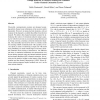Free Online Productivity Tools
i2Speak
i2Symbol
i2OCR
iTex2Img
iWeb2Print
iWeb2Shot
i2Type
iPdf2Split
iPdf2Merge
i2Bopomofo
i2Arabic
i2Style
i2Image
i2PDF
iLatex2Rtf
Sci2ools
114
Voted
CORR
2007
Springer
2007
Springer
Outage Behavior of Discrete Memoryless Channels Under Channel Estimation Errors
Classically, communication systems are designed assuming perfect channel state information at the receiver and/or transmitter. However, in many practical situations, only an estimate of the channel is available that differs from the true channel. We address this channel mismatch scenario by introducing the notion of estimation-induced outage capacity, for which we provide an associated coding theorem and its strong converse, assuming a discrete memoryless channel. The transmitter and receiver strive to construct codes for ensuring reliable communication with a quality of service (QoS), in terms of achieving a target rate with small error probability, no matter which degree of accuracy channel estimation arises during a transmission. We illustrate our ideas via numerical simulations for transmissions over Ricean fading channels using rate-limited feedback channel and maximum likelihood (ML) channel estimation. Our results provide intuitive insights on the impact of the channel estimate...
Related Content
| Added | 13 Dec 2010 |
| Updated | 13 Dec 2010 |
| Type | Journal |
| Year | 2007 |
| Where | CORR |
| Authors | Pablo Piantanida, Gerald Matz, Pierre Duhamel |
Comments (0)

